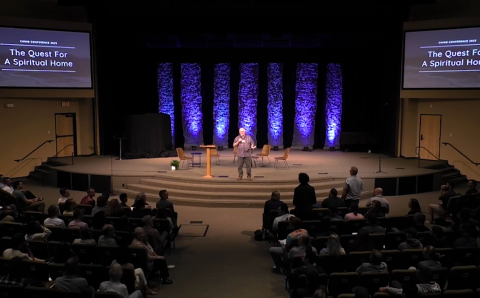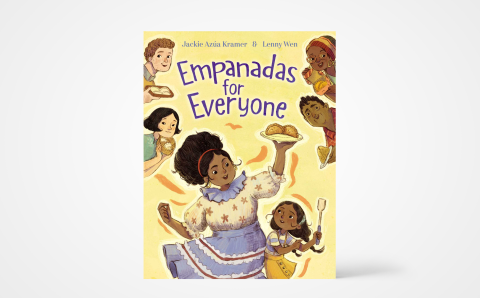I vividly remember the time in my youth that I was in a Bible study with my pastor and we were looking at Luke 14:25-35. I got stuck on Jesus’ words in verse 26: “If anyone comes to me and does not hate father and mother, wife and children, brothers and sisters—yes, even their own life—such a person cannot be my disciple.” I was a new believer, and it was the first time I had read that passage. I was horrified by the verb “hate,” which today means to intensely dislike something or someone. As an Asian youth steeped in a culture that almost idolizes respect for one’s parents, how could I hate my parents or my siblings? I loved them!
At the time, the Bible passage seemed clear to me: If I don’t hate my parents, I can’t follow Jesus. But I could not choose between the seemingly irreconcilable options, and I began to weep. After realizing why I was crying, my pastor quickly reassured me that Jesus did not mean for us to literally hate our parents but simply that we must love Jesus more than anyone or anything else. It was hyperbole, he explained.
Of course, it was still a radical and, to some degree, offensive claim. But it became less harsh when understood not as disliking one’s parents, but as loving them less than one loves Jesus.
My youthful self read our modern understanding of “hate” back into Jesus’ use of the word, making his claim more offensive than it already was. I now know that people in Jesus’ ancient Middle Eastern culture often spoke with colorful hyperbole to make a point. This was their custom, and Jesus’ original audience would have understood his statement to be an exaggeration.
That incident was an early lesson for me in this truth about biblical interpretation: The Bible, even though it’s for us, was not written to us, but to audiences greatly removed from us in time, culture, and language. We can never read Scripture plainly, if by “plainly” we mean ignoring our own cultural biases and the cultural and historical gaps between us and the text. If we do not respect the historical, cultural, and linguistic differences between us and Scripture, we are in danger of reading modern cultural ideas back into the Bible and distorting whatever insights we might get out of it.
Clarity of Scripture
I am not saying that the Bible is so obscure that only Bible scholars can understand Scripture properly. Neither am I arguing against the Reformation’s doctrine of the clarity of Scripture, historically called the “perspicuity of Scripture.” That doctrine does not assert that everything in Scripture is clear and easy to understand. It only teaches that what is necessary for salvation is clear in Scripture. We see this in the Westminster Confession of Faith (1646): “All things in Scripture are not alike plain in themselves, nor alike clear unto all: yet those things which are necessary to be known, believed, and observed for salvation, are so clearly propounded, and opened in some place of Scripture or other, that not only the learned, but the unlearned, in a due use of the ordinary means, may attain unto a sufficient understanding of them” (Ch. 1.VII).
Scripture itself shows that some parts of the Bible are not easy to understand: “(Paul’s) letters contain some things that are hard to understand, which ignorant and unstable people distort, as they do the other Scriptures, to their own destruction,” the apostle Peter writes, (2 Pet. 3:16) and the Ethiopian eunuch needed Philip’s help to understand the prophet Isaiah (Acts 8:26-40).
So even without biblical scholarship, anyone can still read the Bible and sufficiently discern its main message of salvation. But not everything in the Bible is easy to understand, not even for first-century readers like the ones Peter wrote to. How much more difficult must it be for those who are centuries removed from the Scripture’s cultures, customs, and contexts?
Lost in Translation
Modern translations of the Bible, though generally reliable, are not infallible. Despite the translators’ best efforts, there are many cultural and linguistic nuances that cannot always be adequately translated into English or some other language.
For example, most of us know that ancient Greeks had multiple words for “love.” Agape means sacrificial love, philos means brotherly love, and eros denotes erotic or romantic love, to name the most common ones. All of these words are usually rendered into English from the original Greek of the New Testament as simply “love.” Readers of English translations can thus miss out on some linguistic nuances.
In John 21:15-19, for instance, Jesus asks Peter three times if Peter loves him. This is, of course, reminiscent of Peter previously disavowing Jesus three times. We can understand this story as Jesus gently reconciling with Peter and restoring him to his apostleship. What might be lost on us without reading the original Greek, however, is that two different words for “love” were used in that conversation.
The first and second times Jesus asks Peter “Do you truly love me?” he uses agape. In other words, he asks if Peter loves him sacrificially. Peter, however, responds both times with philos, rather than agape: “Yes, Lord, you know that I love (philos) you.” Jesus was asking for a higher standard of love from Peter, but Peter was honest: at that point, he only had a strong, friendship, brotherly love for Jesus.
On the third ask, however, Jesus uses philos: “Simon son of John, do you love (philos) me?” In other words, Jesus condescends to Peter’s level of love. It’s probably why Peter felt a little hurt by that third question. Peter had already said twice that he loved (philos) Jesus. He might have felt that Jesus was questioning whether he truly loved Jesus even at the philos level after conceding that he did not love Jesus with an agape kind of love.
Therefore, despite Peter’s honest admission that he did not love Jesus sacrificially—at least not then—Jesus still commissioned him to feed and care for the spiritual flock. This was Christ’s grace to Peter. His prophecy concerning Peter’s martyrdom (vs. 18-19) suggests that though Peter on that morning might not have loved Christ sacrificially or unconditionally, he would grow to love Christ even to the point of death. All of this rich nuance in the story is lost in translation.
Another example of lost nuance is the phrase “eternal life.” We conventionally understand the phrase to mean “living forever (in heaven).” But for the Jews of Jesus’ time, “eternal life” meant the life of the world to come, bestowed after the resurrection of the dead (IVP Bible Background Commentary, p. 824). This understanding was derived from Daniel 12:2-3. The world to come is the new heaven and earth where God will rule, where sin and its consequences will be no more (Rev. 21). The emphasis, therefore, is not only on the length of life—eternity—but on what kind of life—a life that partakes of God’s new future reality. But our modern minds, obsessed as we are with time, tend to focus on the longevity of eternal life.
Forgotten Contexts
In addition to its linguistic nuances, Scripture also contains a host of assumed and unspoken historical, social, economic, political, and religious contexts. The original audience would have known all of these contexts—they were living in them! The Bible’s authors did not need to spell them out. But we, centuries removed, do not know those contexts without biblical scholars and historians helping us fill in the gaps. And, sometimes, those contexts can be pivotal in understanding a passage.
As one example, the parable of the great banquet in Luke 14 is better understood if we know its social and religious contexts. For one thing, the parts about seating arrangements are better appreciated if we understand the social customs of the time. But another part of the story is also enriched by cultural understanding.
Jesus had encouraged his host, a prominent Pharisee, to invite “the poor, the crippled, the lame, (and) the blind” (v. 13) instead of people with social status who could repay the host with favors down the road. “Although they cannot repay you,” said Jesus, “you will be repaid at the resurrection of the righteous” (v. 14).
On hearing this, one of the dinner guests says, “Blessed is the one who will eat at the feast in the kingdom of God” (v. 15). Behind this saying is a theology about the messianic banquet in God’s kingdom. Among the Dead Sea Scrolls, there is one that talks about a common Jewish belief in Jesus’ time about the messianic banquet—the celebration feast when the Messiah ushers in the new world of God’s kingdom (Kenneth Bailey writes about this in his book Jesus Through Middle Eastern Eyes, p. 311). Gentiles, they believed, would not be part of this messianic banquet. Any unrighteous Jew is also excluded. So is anyone who is crippled in hand or foot, lame or blind, deaf or unable to speak, senile or diseased. So when this guest said, “Blessed is the one who will eat at the feast in the kingdom of God,” what he meant was, “You know, none of those poor, crippled, blind, or lame you asked the host to invite will be part of that messianic banquet when God’s kingdom comes. You, Jesus, seem to forget that those people are ultimately not blessed.” He was trying to correct Jesus’ theology!
Jesus responds to this challenge with a parable about a great banquet. In this parable, all of the originally invited guests—presumably those with high social status—fail to honor the host’s invitation. The host instead invites the poor, the lame, and the blind, and when there’s still room, he goes out to compel those who are out on the roads and the lanes—people who might be homeless or Gentiles or foreigners traveling along the roads. Jesus, in response to the theology of his day, was saying (among other things), “You think that the messianic banquet is only for religious leaders and do-gooders? Well, you are wrong! God’s table is graciously inclusive. God’s feast is radically hospitable to all. It’s a feast that will be filled with precisely those people you think are excluded: the outcasts, the poor, the lame, the blind—even Gentiles!”
Without knowing that religious context about the messianic feast, we might not have grasped this layer of meaning—one of many in this text.
Cultural Humility
I hope the few examples here show why we need to have cultural humility when we read the Scriptures. Failure to do so can cause us to misread Scripture. And that can sometimes cause a great deal of harm.
How much harm, for example, did American Christians in the antebellum South cause by misusing 1 Peter 2:18? It reads (in the then popular King James Version), “Servants, be subject to your masters with all fear; not only to the good and gentle, but also to the froward (i.e. difficult or fractious).” Christians had used this text to resist the abolition of slavery and to require Black slaves to remain subservient, even to cruel masters. After all, the Bible’s instruction seemed pretty clear.
What antebellum Christians didn’t know—or forgot—was that Peter was giving pastoral advice to household slaves in an imperial setting where there was no real possibility of emancipation. Those Christians should not have applied Peter’s words uncritically to their context as if Peter was writing to 19th-century Black slaves in America.
Finally, no matter how clear a specific passage might seem to us, we need to always interpret and apply it in light of the whole of Scripture. For this example, Paul’s admonition to slave masters and the belief of equality between slaves and masters before God (Eph. 6:9) provides important balance.
Despite knowing more today than many Christians in the past, we still need to be careful and humble when interpreting and applying Scripture. If we do not respect historical and cultural differences, we can inadvertently misread Scripture through our own modern cultural lenses.
Discussion Questions
- How have you understood the doctrine of the clarity of Scripture? How have you heard it explained or (mis)used by others?
- What other examples can you give that illustrate how historical and cultural contexts or linguistic nuances can help you better understand a Bible passage?
- What other examples from church history show how harmful cross-culturally misreading Scripture can be?
- What steps can you take to equip yourself to better read or interpret Scripture cross-culturally?
About the Author
Shiao Chong is editor-in-chief of The Banner. He attends Fellowship Christian Reformed Church in Toronto, Ont.
Shiao Chong es el redactor jefe de The Banner. El asiste a Iglesia Comunidad Cristiana Reformada en Toronto, Ont.
시아오 총은 더 배너 (The Banner)의 편집장이다. 온타리오 주 토론토의 펠로우쉽 CRC에 출석한다.
You can follow him @shiaochong (Twitter) and @3dchristianity (Facebook).









